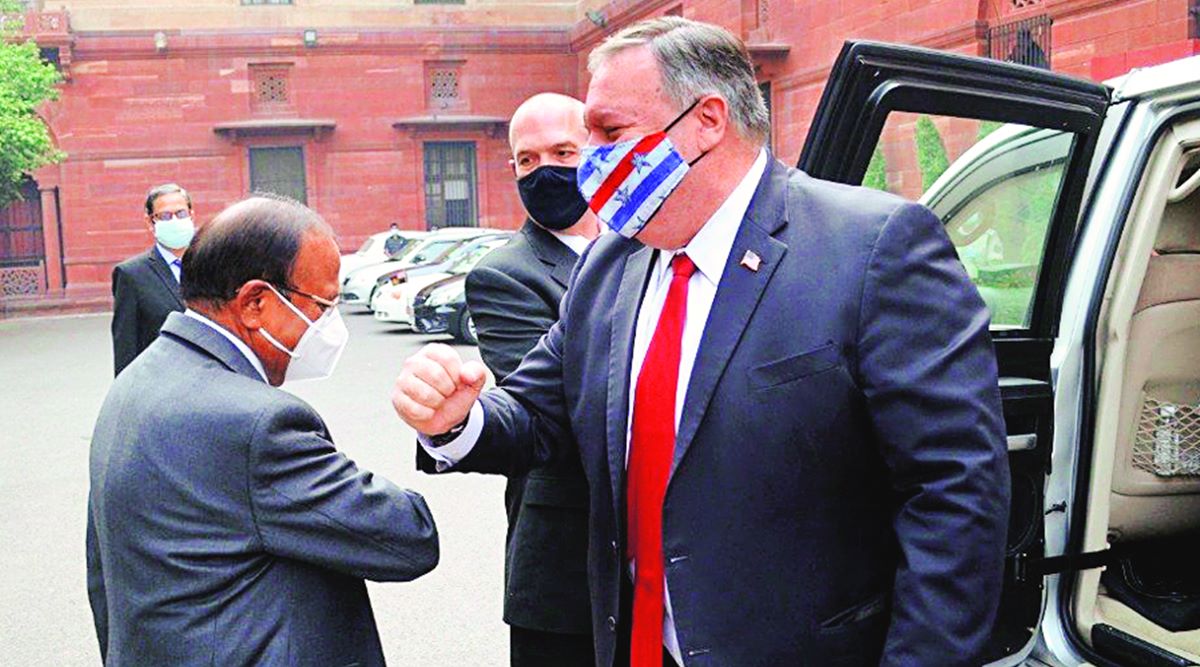 NSA Ajit Doval and US Secretary of State Michael Pompeo greet each other at South Block in New Delhi Tuesday. (ANI)
NSA Ajit Doval and US Secretary of State Michael Pompeo greet each other at South Block in New Delhi Tuesday. (ANI)AS India and the United States announced Tuesday signing of the crucial military pact, Basic Exchange and Cooperation Agreement (BECA), visiting US Secretary of State Michael R Pompeo recalled the Galwan valley incident in June and said that the US would “stand with the people of India to confront threats to their sovereignty and to their liberty”.
From the Hyderabad House lawns and with Defence Minister Rajnath Singh and External Affairs Minister S Jaishankar by their side, the visiting US ministers, Pompei and Defence Secretary Mark T Esper, launched a sharply worded attack on China.
The four of them were addressing the media after meeting Prime Minister Narendra Modi.
While Pompeo said that Indian and US leaders and citizens see with “increasing clarity” that the Communist Party of China (CCP) is “no friend to democracy and rule of law”, Esper set his sights at Beijing as he flagged the “increasing aggression and destabilising activities by China”.
Indian and Chinese soldiers are locked in a border standoff for more than five months and as the harsh winter begins, BECA will help New Delhi get real-time access to US geospatial intelligence that will enhance accuracy of automated systems and weapons like missiles and armed drones.
It will also help access topographical and aeronautical data and advanced products which will aid navigation and targeting. This could be key to Air Force-to-Air Force cooperation between India and the US.
Singh and Jaishankar, however, did not name China, but talked about “respecting” and “upholding” the “territorial integrity and sovereignty” of all states — a not-so veiled reference to Beijing’s belligerence along the Line of Actual Control (LAC).
Pompeo, in his remarks, said: “The challenge of defeating the pandemic that came from Wuhan also fed into our robust discussion about the Chinese Communist Party. Our leaders, and our citizens, see with increasing clarity, that the CCP is no friend to democracy, the rule of law, transparency, nor to freedom of navigation, the foundation of a free and open and prosperous Indo-Pacific. I am glad to say that the United States and India are taking steps to strengthen cooperation against all manner of threats and not just those posed by the Chinese Communist Party.”
Recalling his visit to the war memorial in the capital this morning, Pompeo said: “We went…to honour the brave men and women of the Indian Armed forces who have sacrificed for the world’s largest democracy including 20 that were killed by the PLA forces in the Galwan valley in June. United States will stand with the people of India to confront threats to their sovereignty and to their liberty”.
Echoing this, Esper cited China as well: “The defence ties between our two nations remain a key pillar of our overall bilateral relationship. Based on our shared values and common interests, we stand shoulder to shoulder, in support of a free and open Indo Pacific for all, particularly in light of increasing aggression and destabilising activities by China.”
Singh framed the security situation in terms of a “shared assessment” of the security situation across the Indo Pacific. “We reaffirmed our commitment to peace, stability and prosperity of all countries in this region. We also agreed that upholding the rules-based international order, respecting the rule of law and freedom of navigation in the international seas and upholding the territorial integrity and sovereignty of all states are essential. Our defence cooperation is intended to further these objectives,” Singh said, adding that both sides welcomed Australia joining the forthcoming Malabar Exercise.
Jaishankar took his cue from Singh, but added that “a multi-polar world must have a multi-polar Asia as its basis” — signalling that China’s hegemonic behaviour in Asia works against India’s interests and aspirations.
“As you have heard from my colleagues, the Indo-Pacific region was a particular focus of our talks. We reiterated the importance of peace, stability and prosperity for all countries in this region. As Raksha Mantri stated, this is possible only by upholding the rules-based international order, ensuring the freedom of navigation in the international seas, promoting open connectivity and respecting the territorial integrity and sovereignty of all states. A multi-polar world must have a multi-polar Asia as its basis,” Jaishankar said.
“Our national security convergences have obviously grown in a more multi-polar world,” he said, adding they are meeting today to not only advance “our own interests but to ensure that our bilateral cooperation makes a positive contribution in the world arena.” We are also committed to addressing together global issues ranging from maritime security to counter-terrorism.
A key takeaway was cooperation in third countries. Singh said, “In today’s meeting we also explored probable capacity-building and other joint cooperation activities in third countries, including our neighbourhood and beyond.”
Discussions also covered developments in neighbouring countries including Afghanistan and Pakistan. “We made clear that cross-border terrorism is completely unacceptable. On Afghanistan, India’s stakes in its security and stability are evident, as is our willingness to contribute to international efforts to that end,” Jaishankar said.
Besides BECA, four more pacts were signed on earth sciences, nuclear energy, Customs data, Ayurveda and cancer research.